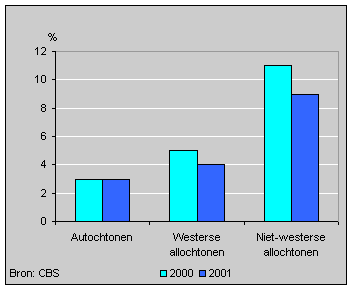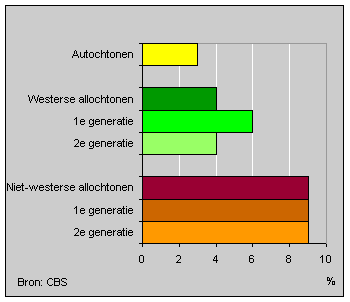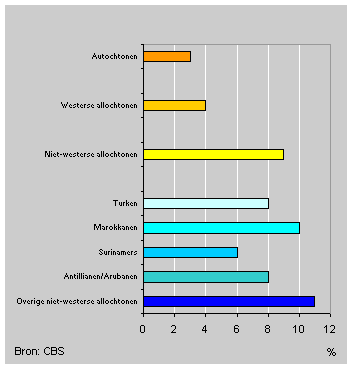Non-western immigrants benefit from favourable labour market

Unemployment among non-western immigrants fell in 2001, while among Dutch nationals it remained stable. In spite of this, non-western immigrants are still three times as likely to be unemployed as native people. Among them, Surinamese people are least often unemployed.
Unemployment among 15-64 year-olds by ethnic group, 2000-2001

Lower unemployment among non-western immigrants
Unemployment among non-western immigrants in the Netherlands decreased in 2001: nine percent were unemployed, compared with eleven percent in 2000. Unemployment among the Dutch native population was three percent in both years. For western immigrants unemployment fell by one percent point to four percent in 2001.
It seems as if non-western immigrants, therefore, have been able to benefit from the tighter labour market. In spite of this, though, unemployment in this group is still three times as high as among Dutch nationals.
Unemployment by ethnic group, 2001

Fist and second generation immigrants
Unemployment is just as high among non-western immigrants born in the Netherlands (the so-called second generation immigrants) as among those born abroad: nine percent of both generations were unemployed.
Only among western immigrants is unemployment among the first generation higher than among the second. In 2001, six percent of the first generation were jobless, compared with four percent of the second generation. Unemployment among second generation western immigrants is nearly the same as the three percent among Dutch natives.
Unemployment among 15-64 year-old non-western immigrants, 2001

Surinamese least likely to be unemployed
Of all non-western immigrants people from Surinam have the lowest rate of unemployment: six percent. Moroccans are one and a half times as likely to be unemployed: one in ten Moroccans were out of a job in 2001. Eight percent of people with a Turkish or Antillean/Aruban background are unemployed.
Sabine Lucassen